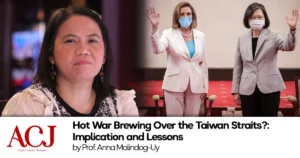REP. Joseph Lara has filed a resolution at the House directing the appropriate committee to conduct an inquiry in aid of legislation on the alleged surge of Chinese students enrolling in various higher education institutions (HEIs) in Cagayan province, particularly in the city of Tuguegarao, with the aim of ensuring national security amid the prevailing situation in the disputed South China Sea. Hearings may likely start toward the end of April.
Lara’s resolution states that these Chinese students are reportedly being sponsored by the local government units (LGUs) of Tuguegarao City and the provincial government of Cagayan as these two LGUs are supportive of China’s Belt and Road Initiative, and opposed to the Enhanced Defense Cooperation Agreement (EDCA).
Cagayan hosts two EDCA sites: Naval Base Camilo Osias and Lal-lo Airport. The resolution also says that the increase in Chinese students in the province of Cagayan is very unusual. Their activities are highly suspicious and alarming, causing worry and concern among local townsfolk and seriously threatening the national security of the Philippines, the resolution said.
Three senators — Joel Villanueva, Risa Hontiveros and Francis Escudero — have joined the fray, which could precipitate a counterpart Senate hearing/investigation. The senators said they were alarmed by the report that Chinese students in Cagayan are reportedly paying P2 million to obtain their degrees. Meanwhile, the Armed Forces of the Philippines said it would check on the report concerning the influx of Chinese students into Cagayan.
Voices from Cagayan
The sentiments emerging from Cagayan and its higher education institutions resonated with a difference in stance and a nuanced perspective.
The Tuguegarao government, under the capable leadership of Mayor Maila Rosario Ting-Que, said it supported the internationalization of the learning institutions as espoused by the Commission on Higher Education (CHEd).
It said: “We respect the academic freedom of HEIs in adopting international programs that admit foreign students, regardless of their citizenship. As such, we are saddened and dismayed that a legislator, who is supposed to fully grasp national policies, has created issues that harm the international programs of these esteemed institutions.
“Linking the Tuguegarao city government to the alleged ‘sponsorship’ of Chinese students in the city is a sheer attempt to politicize the issue. We vehemently deny any act of sponsorship in favor of foreign nationals, as this will never be allowed by the law and the regulations of the Department of Budget and Management and Commission on Audit. Ang pera ng Tuguegarao ay inilalaan para sa mga Pilipino (The funds of Tuguegarao are intended for Filipinos).”
Mayor Ting-Que added: “May we emphasize that the entry of foreign nationals is outside the ambit of the local governance. The Department of Foreign Affairs issues the visas while the Bureau of Immigration screens their entry. We implore the concerned personalities to revisit their knowledge of government processes and avoid inciting ideas that are misplaced and bereft of merit.”
Moreover, on April 18, 2024, the four HEIs in Tuguegarao City — the Medical Colleges of Northern Philippines, the University of Cagayan Valley, the University of Saint Louis Tuguegarao and St. Paul University Philippines — issued a joint statement in response to claims that mounting numbers of Chinese students in Cagayan are alleged “milking cows” of schools and a threat to national security.
The statement stated: “The enrollment of foreign students in Cagayan province is a testament to the province’s commitment to diversity, inclusivity and respect for human rights. By welcoming students from other countries, the province is demonstrating its commitment to the values of tolerance, respect and understanding. This can help create a more peaceful, harmonious and inclusive society.”
“The insinuation that the presence of Chinese students in the city’s universities poses a threat to national security is not only baseless but also deeply offensive. It is a blatant display of racism and Sinophobia that has no place in our society, especially within the realm of education. The insinuation that Cagayan universities are diploma mills is insulting and may be libelous. Students undergo a rigorous vetting process aligned with CHEd requirements, which include completing academic courses, comprehensive examinations and a thesis/dissertation.
“While upholding Philippine sovereignty and commitment to national sovereignty, the concerned private HEIs in Cagayan continue to embrace internationalization in education as our response to globalization. Furthermore, we uphold the principles of academic freedom, diversity and inclusivity as the cornerstone of our educational institutions. “
Hindsight
My immediate reaction to this issue is one of surprise. Lara’s proposed House resolution carries undertones reminiscent of McCarthyism, a dark era in the US marked by pervasive fear and suspicion, particularly toward those perceived as communists. Additionally, it echoes the sentiments of the “Red scare,” a period marred by racial discrimination, political persecution and the suppression of civil liberties/rights in the name of national security.
Indeed, the resolution makes accusations based on suspicions without proper regard for solid evidence. It subtly suggests that Chinese students attending private HEIs in Cagayan are spies and pose a threat to national security, devoid of substantive evidence to support such claims.
This is quite a dangerous precedent for the Philippines, a nation that values democratic principles and upholds human rights for all, regardless of nationality or ethnicity. Such actions erode the civil liberties of Chinese enrolled in Cagayan’s private HEIs, potentially creating a chilling effect on other foreign students pursuing education in the Philippines.
No doubt, Lara is politicizing the issue, aligning with strategies reminiscent of those found in the US political playbook, inadvertently cultivating an environment of unwarranted and unfair racial prejudice. By leveraging geopolitical tensions to question the presence of Chinese students in the country, especially in Cagayan, where two EDCA sites (US military bases) are located, lawmakers like Lara might be inadvertently stoking dangerous xenophobic sentiments.
It’s imperative to reflect on whether such actions can potentially fuel harmful attitudes toward foreign students in the Philippines, especially Chinese students.
Conclusion
In retrospect, the McCarthyism undercurrent with a touch of racial discrimination in the proposed House resolution against foreign students, particularly those from China, calls for a committed response from various segments of Philippine society who adhere to the principles of democracy and human rights to foster inclusivity and understanding.
The responsibility to address these issues is not an isolated task but a shared one. Education bodies, student organizations, civil society groups and local communities must unite and collaborate to create an environment where racial and cultural differences are protected, valued and embraced.
This requires commitment from every sector of society to ensure that educational experiences are enriched by diversity rather than marred by prejudice and discrimination. As a peaceful, loving and hospitable nation, we should create an atmosphere where foreign students from China and all corners of the globe feel as much a part of their chosen academic communities as their local counterparts.
Source: The Manila Times
https://www.manilatimes.net/2024/04/20/opinion/columns/fostering-inclusivity-amid-diversity-rejecting-mccarthyism-and-racial-bias/1942342



